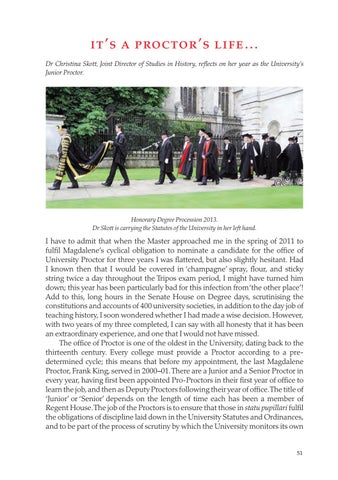it’s a proctor’s life… Dr Christina Skott, Joint Director of Studies in History, reflects on her year as the University’s Junior Proctor.
Honorary Degree Procession 2013. Dr Skott is carrying the Statutes of the University in her left hand.
I have to admit that when the Master approached me in the spring of 2011 to fulfil Magdalene’s cyclical obligation to nominate a candidate for the office of University Proctor for three years I was flattered, but also slightly hesitant. Had I known then that I would be covered in ‘champagne’ spray, flour, and sticky string twice a day throughout the Tripos exam period, I might have turned him down; this year has been particularly bad for this infection from ‘the other place’! Add to this, long hours in the Senate House on Degree days, scrutinising the constitutions and accounts of 400 university societies, in addition to the day job of teaching history, I soon wondered whether I had made a wise decision. However, with two years of my three completed, I can say with all honesty that it has been an extraordinary experience, and one that I would not have missed. The office of Proctor is one of the oldest in the University, dating back to the thirteenth century. Every college must provide a Proctor according to a predetermined cycle; this means that before my appointment, the last Magdalene Proctor, Frank King, served in 2000–01. There are a Junior and a Senior Proctor in every year, having first been appointed Pro-Proctors in their first year of office to learn the job, and then as Deputy Proctors following their year of office. The title of ‘Junior’ or ‘Senior’ depends on the length of time each has been a member of Regent House. The job of the Proctors is to ensure that those in statu pupillari fulfil the obligations of discipline laid down in the University Statutes and Ordinances, and to be part of the process of scrutiny by which the University monitors its own
51














